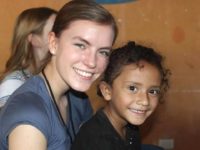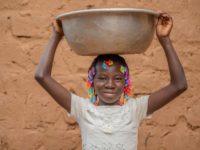Leaving Uganda will be one of the hardest things I’ve ever had to do. I’ve fallen in love with the people here. They are the most welcoming, generous and humble people I’ve ever met.
One lady I visited gave me a beautiful hand-made basket as a gift. It took her several months to make it. She filled it with eggs and avocados. Why does this stand out so much? She is a single mom, HIV-positive and struggling to raise two sons on about 80 cents a day. And yet she insisted that I take the gift. It will be one of my prize possessions.
The people of Uganda are also the most joyful people I’ve ever met, which is interesting considering most of them live on less than a dollar a day. One man I met told me, “In Uganda, you may not be able to afford dinner, but you’ll still wake up with a smile on your face the next morning.”
I asked our guide, Ezra, how people here remain so full of hope. He explained that everyone in Uganda takes care of each other. “People know their neighbors and look out for one another,” he said. “If someone is going through a hard time or grieving, he will be surrounded. No one goes through anything alone.”
In the U.S., we might have material possessions, but it seems they have something many of us don’t — true community.
Robyn Spencer, a full-time writer for Compassion International, is currently on her first Compassion trip to Uganda. Robyn is experiencing Compassion’s life-changing work first-hand, so she can educate sponsors and donors when she returns home.







2 Comments |Add a comment
Ezra’s description of Uganda reminds me of Wess’s description of life in his village. If a child fell and hurt himself, the nearest village woman picked him up and comforted him. The children, likewise, took care of each other.
Yes, they are rich in ways that Americans are so very poor.
“He explained that everyone in Uganda takes care of each other. “People know their neighbors and look out for one another,” he said. “If someone is going through a hard time or grieving, he will be surrounded. No one goes through anything alone.”
We sure could learn something from that.
When my wife visited her child in Bolivia, the child’s father gave her a pin (that the women use to secure their shawls). It was a silver spoon that had been hammered flat, but yet it was a family heirloom. It likely might have been this child’s most valueable possession, but my wife knew she had to take it.
Wess Stafford said it best when he said you just can’t out-give the poor.